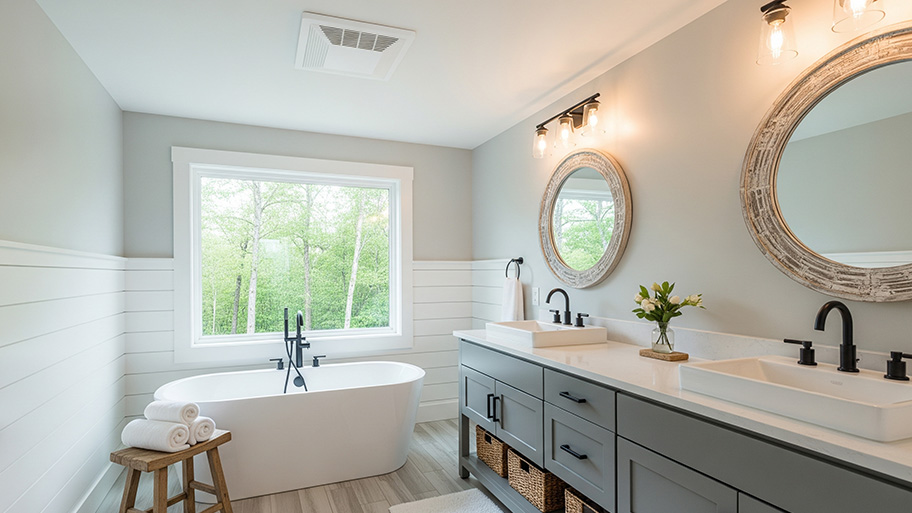
Curious about air duct cleaning costs? Get insights into pricing factors, benefits, and how to tell when it’s time for a good cleaning.
Expert guidance is mixed when it comes to cleaning your air ducts to keep the air clean


You want your family to have the cleanest air possible in your home. And while having your ducts professionally cleaned may seem like it would help keep your air clean, the U.S. Environmental Protection Agency (EPA) guidelines say it’s not necessary unless you can see mold growth. Here are eight duct cleaning guidelines you should know before deciding whether to have yours cleaned.
The reasoning behind the EPA guidelines surrounding duct cleaning is pretty simple: They determined duct cleaning had little to no effect on dust levels in the home. The dirt in your air ducts tends to adhere to the surface of the ducts, so it actually doesn’t make its way into your home via the air blowing in. Also, duct cleaning hasn’t been shown conclusively to prevent health problems.
When a top-rated duct cleaner near you cleans your air ducts, they use a special rotating bristle brush with a high-efficiency air particulate (HEPA) filter and a vacuum. The pro will move the device through your ducts several times to clean out any dirt, dust, or debris. Then, they usually perform a furnace and coil cleaning to finish the job.
When you have your ducts cleaned, the technician might spray on an anti-microbial spray that’ll make your home smell better in the short term. But usually, odors are caused by one of a few things:
Outside air leaking in through improper seals
Rodents and animal droppings or fur
Mold or moisture
A regular duct cleaning won’t fix any of those issues. If you’re having problems with odors in your home, it might be a good idea to install an air purifier, either room-sized or—if it’s in your budget—a whole-home system.
If you decide to hire a local air duct cleaner to clean or replace your air ducts, make sure you check out at least three companies and compare pricing and practices. Asking for recommendations from friends and family is always a good bet to find contractors if you don’t know where to start.
Interview potential providers and ensure they follow the National Air Duct Cleaners Association’s guidelines and have experience with systems like yours. Also, check to see they hold the appropriate state licensing, and get a written estimate for the job. Do your due diligence so you don’t fall prey to common air duct cleaning scams.

Your furnace filter’s function is to help your system run at its peak performance. Neglecting your furnace filter can drive up your energy bills, compromise your air quality, and make your system work harder. Change your filter at least every 90 days but more frequently (at least monthly) if you have allergy sufferers or pets in the home.

Reducing the dust in your home will not only make it look and smell better, but it’ll also help keep your ducts cleaner because you’re eliminating debris that can get sucked into your system. Go over your home frequently with a vacuum, preferably one with a HEPA filter, and dust with a device that picks up dust instead of a feather duster that just moves it around.
Immediately address any leaks that allow moisture where it’s not supposed to be, with your ductwork being no exception. If you suspect you have a leak in your ducts where water is getting in, have it repaired right away so mold doesn’t build up in your system.
Sealing and insulating your ductwork will increase its energy efficiency because less of the hot and cold air pumping through your system can escape. It can also keep pollutants out of your ducts, which means less need to have your ducts cleaned since dirt and grime aren’t building up inside them.
From average costs to expert advice, get all the answers you need to get your job done.

Curious about air duct cleaning costs? Get insights into pricing factors, benefits, and how to tell when it’s time for a good cleaning.

Whole-house air purifier costs depend on a variety of factors, including your home’s size and layout. The type of purifier you choose matters, too.

If you are wondering which duct cleaning chemicals you should use, we break down all of your options so you can make an informed decision when hiring a pro.

The best bathroom exhaust fan venting option exits through your roof. However, other choices exist if a roof vent installation is not possible.

Some believe that hiring an air duct cleaning pro to clean your ducts can have benefits for your air circulation. Here’s how to determine if it’s useful for you.

Your air ducts deliver warm and cool air to each room, but if they’re dirty, they may not work as well as they should. But does air duct cleaning save energy?